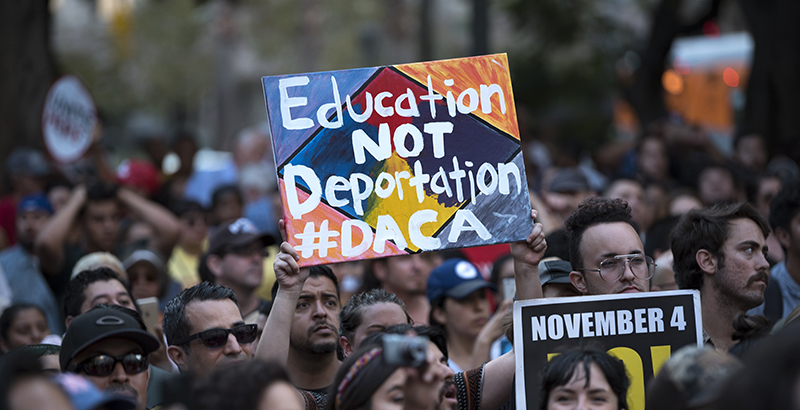Williams: On Trump, DACA, and the Children You Haven’t Read About Who Will Be Hurt in a Crueler, Weaker U.S.

The roars of dissent radiated out for blocks in every direction from the White House Tuesday. Hundreds — perhaps more — of angry Americans cycled through an almost-constant protest in response to the Trump administration’s decision to end the federal Deferred Action for Childhood Arrivals (DACA) program.
Meanwhile, Jeff Sessions grinned his way through announcing that he was putting 800,000 hardworking young U.S. adults out of the labor market and back into the shadows. Naturally, the angry chorus wasn’t audible in Washington, D.C.’s plethora of acoustically insulated news soundstages, where pundits were already hard at work handicapping the political winners and losers in the new world framed by Trump’s decision.
Outside, the calculations were somewhat different. It was a disastrous day for America’s present — and somehow, an even worse one for its long-term future. Over 90 percent of DACA recipients are employed. They are teachers, lawyers, and veterans. Nearly half of DACA recipients are enrolled in some level of further education. Their contributions to the United States economy are estimated to be around half a trillion dollars over the next decade.
Meanwhile, it was a bewildering day for those conservatives who insisted in November — and especially those who have maintained — that Trump “wouldn’t be so bad” as all that, that his advisers would inexplicably rein him in, that his administration could be useful and effective on a few pet issues (usually things like school choice, large tax cuts for the already-prosperous, and — inauspiciously — DACA, back when Trump was promising to deal with these young people with “heart”).
Tuesday was also an astonishing setback for the God of Abraham and His son, the Prince of Peace. It was a challenging day for his followers here on Earth. For He once led migrants out of Egypt and sheltered them en route to their new haven. He called upon humans to love one another above all, and warned that He will someday judge each of us based on how we have treated the weak, the powerless, the strangers, and — especially — the children.
Above all, it was a terrible day for young Americans. I’ve written before about the effect Trump is having on young children of immigrants. They are authentically, legitimately terrified of him and his party, who seem jointly determined to persecute them through public prosecution of their families. These fears are sadly easy to understand — and, naturally, are central to understanding the full depths of cruelty of the Trump administration’s persistent attacks on American diversity, multiculturalism, and multilingualism.
(Read The 74 on The Guardian: Scared at School)
But somehow, there were still other losers from Tuesday’s DACA decision. What of America’s other children? What is Trump teaching the children of native-born Americans?
They are hearing that diverse languages, cultures, and skin tones are dangerous threats to their communities. They are learning that the United States is weak, that it cannot possibly “win” at anything unless others lose. They are learning that American exceptionalism is not defined by our peaceful, plural democratic society. Nor are we exceptional in our bootstrapping, meritocratic economic competitiveness.
No, we are now teaching our children that we are simply another country animated by protectionism. We are afraid that our culture is growing and changing. We are nervous that it might change too much. We are worried that new workers in our country might “steal” something from us, rather than help us grow the economic pie for everyone.
This is not the America I grew up in. That country viewed immigrants through a complicated mix of magnanimity and self-interest. It knew itself to be strong enough to take in the world’s weak and persecuted. It was proud to be a shelter for the refugee and a training ground for democracy. In those years, America also recognized that immigrants and their children were assets that made our economy more robust and our culture more interesting.
The country was neither perfect nor unanimous in these things, naturally. The country’s anxieties about its diversity have deep roots running back centuries. Then, as now, anti-immigrant voices were part of our national conversation.
And yet, the contrast with Trump’s America is stark. Under this man’s leadership, America is neither confident nor brave. This America is myopic and selfish — and it’s certainly not becoming “great.”
Still, it was a good day for the angry. It was a soothing day for the fearful. It was a satisfying day for the vengeful, who slake their own anxieties on harming others.
Their validation carries a steep price for the rest of us. What will be the long-term costs to our national wealth, pride, and dignity as our children grow up? Will it be worth it? Whatever the short-term political fallout, it’s hard to imagine any accounting that winds up looking like a win for the United States.
Get stories like these delivered straight to your inbox. Sign up for The 74 Newsletter

;)
